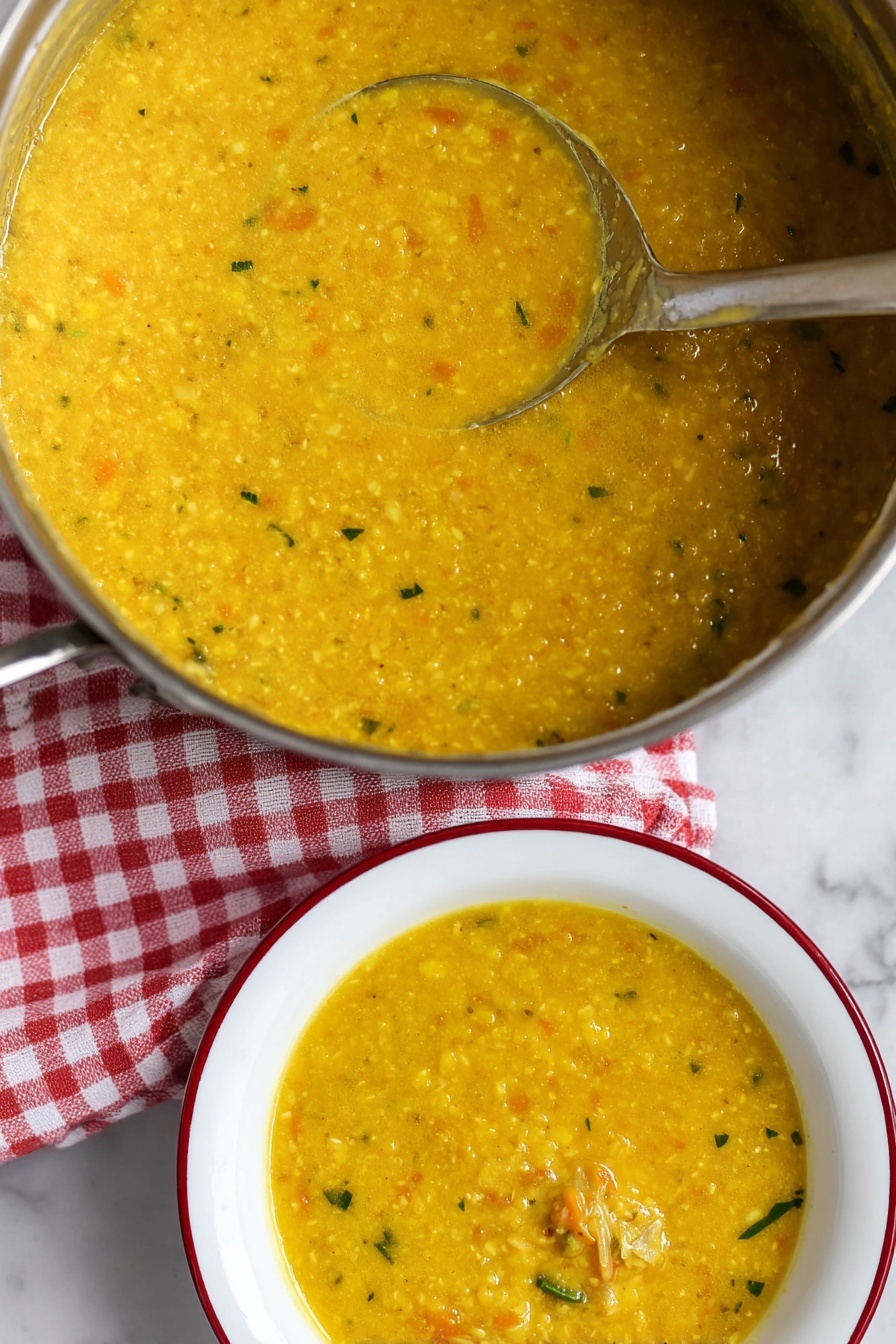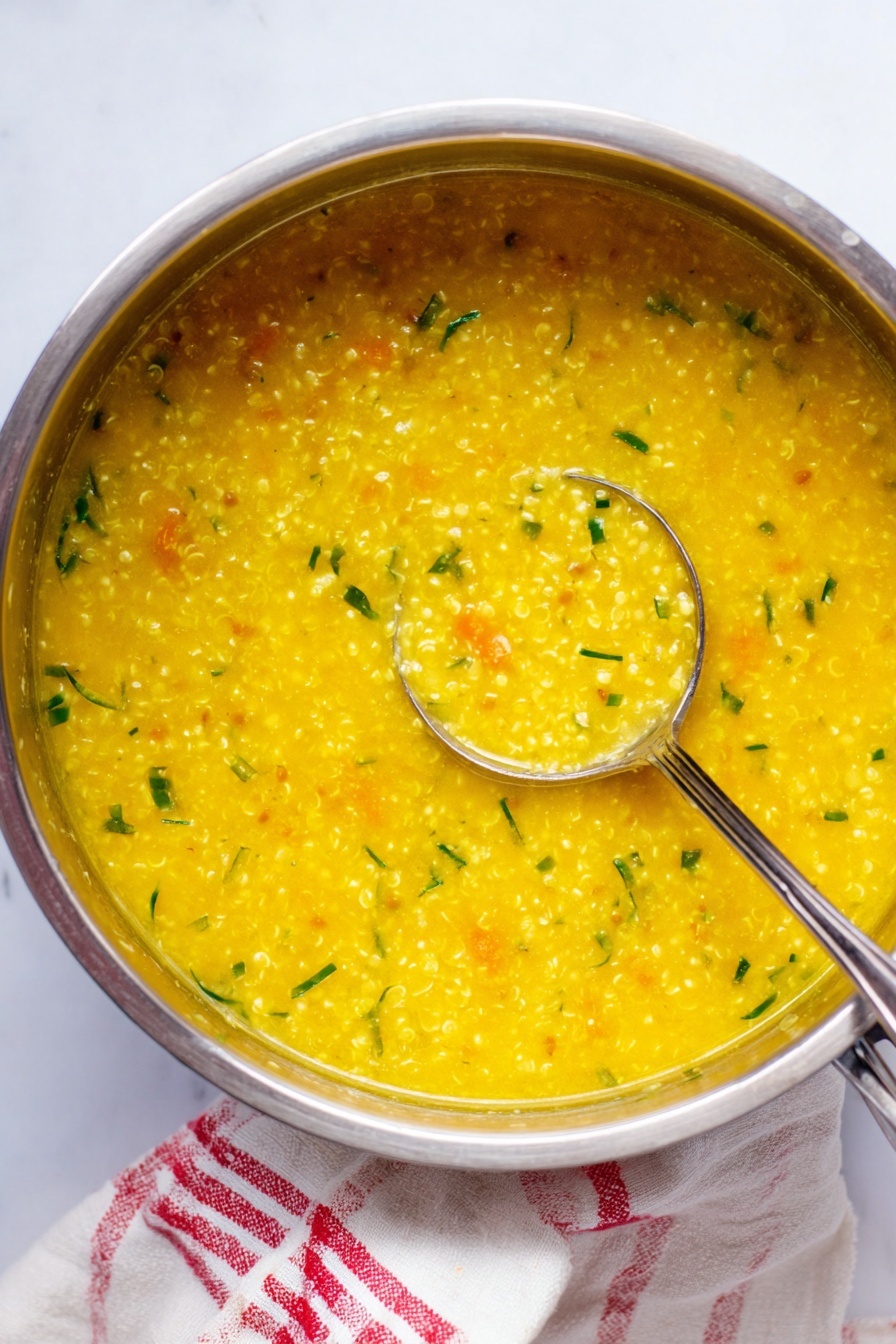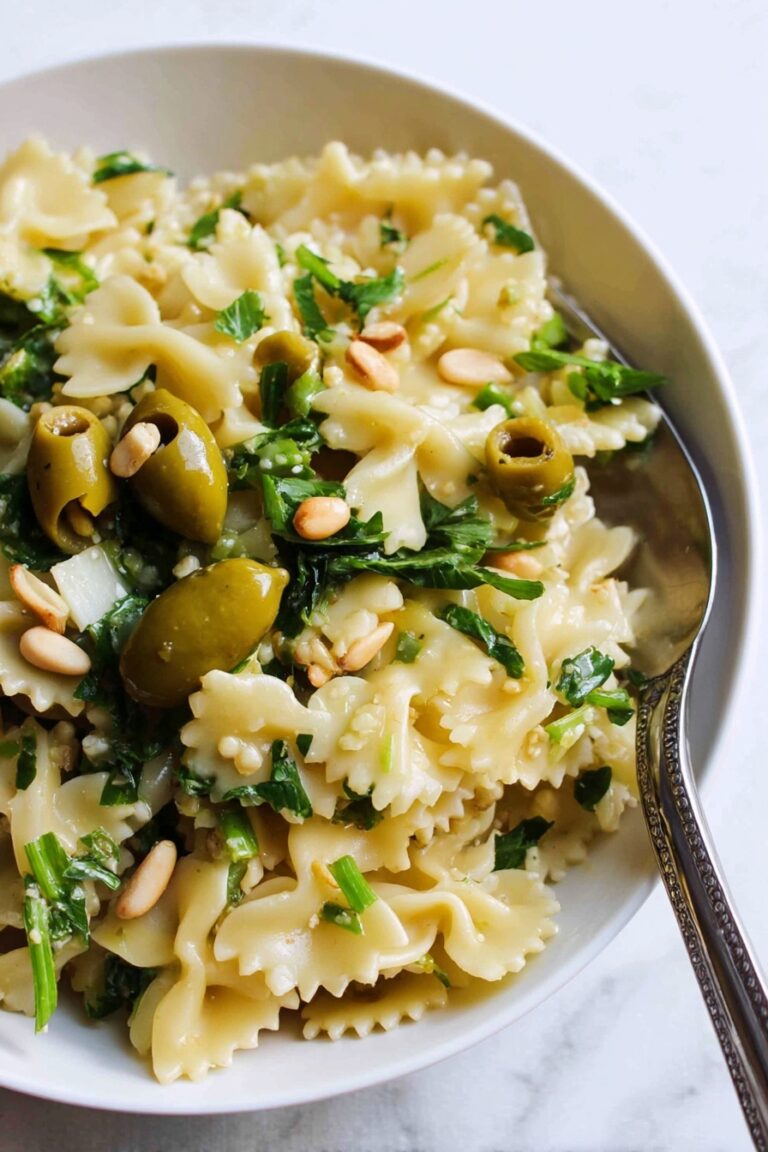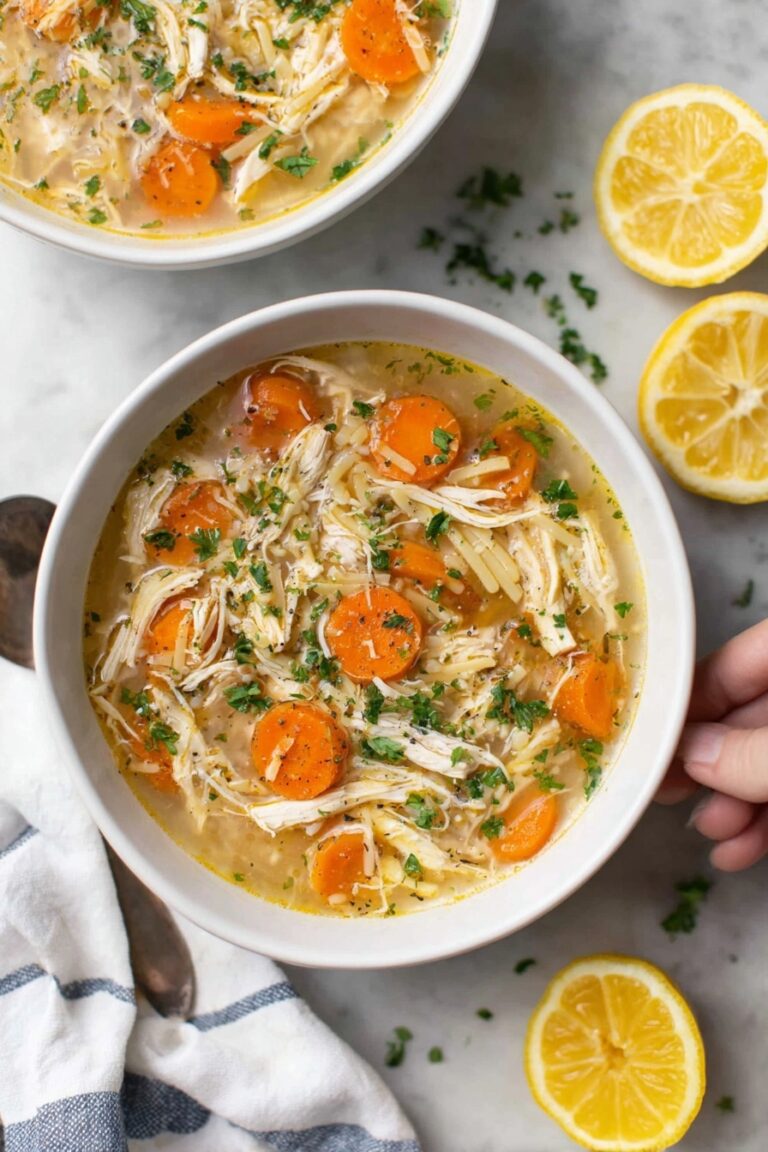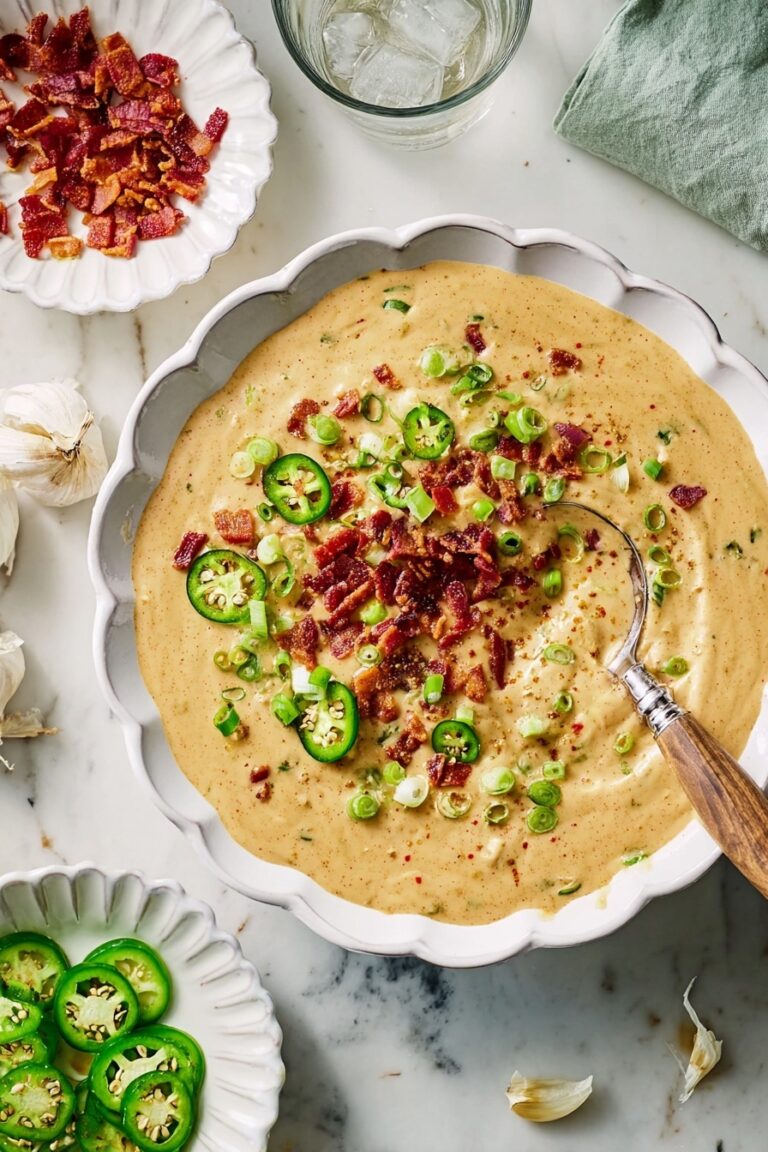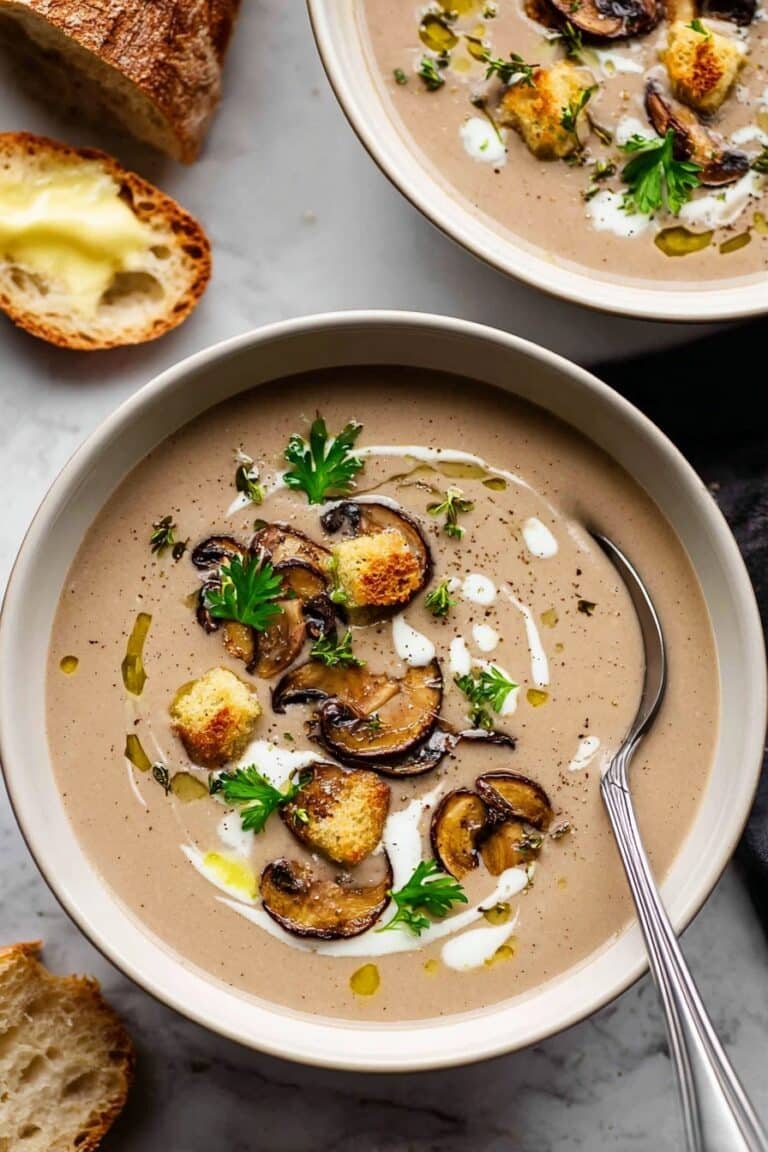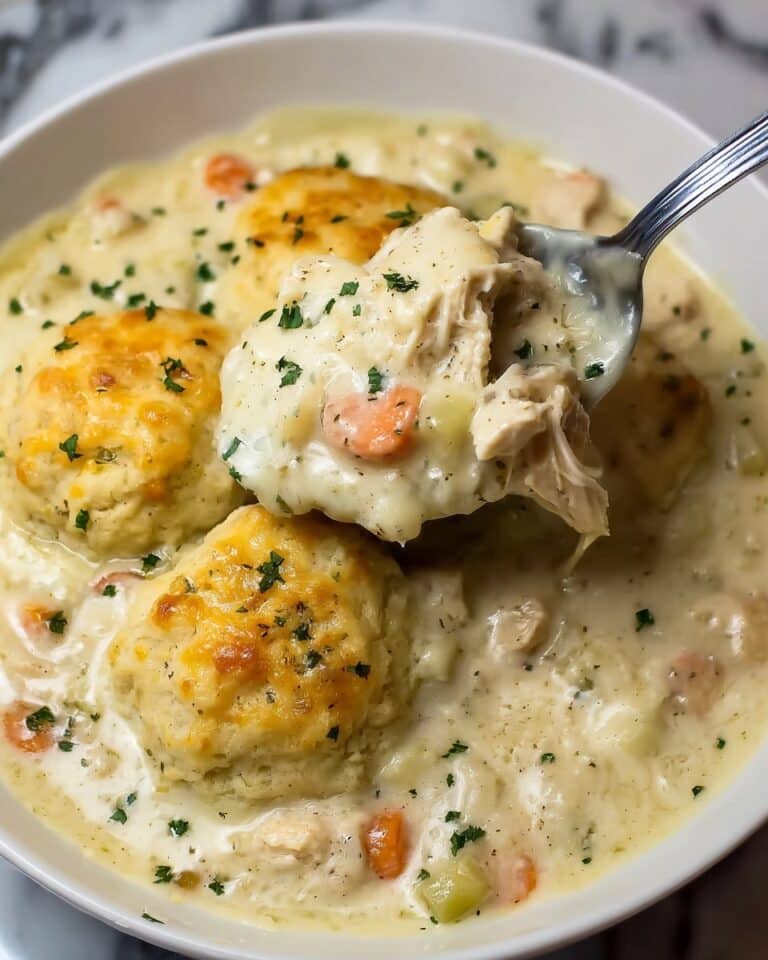Italian Pastina Soup Recipe
If you’re craving a cozy, comforting soup that’s quick to whip up yet packed with flavor, you’ve got to try this Italian Pastina Soup Recipe. It’s one of those dishes that feels like a warm hug in a bowl, perfect for any day of the year – whether you’re under the weather, in need of something soothing, or just hungry for a taste of simple Italian comfort. Stick around, and I’ll share with you all the little tips and tricks I use to make it absolutely fan-freaking-tastic every single time.
Why This Recipe Works
- Simple, Fresh Ingredients: You don’t need fancy stuff here – just basics that blend into a rich, tasty experience.
- Creamy Texture Without Cream: Pureeing the vegetables creates a naturally velvety base that’s both light and satisfying.
- Perfect Pastina Cooking: Adding the tiny pasta last ensures it’s tender but not mushy – an easy step that lifts the whole dish.
- Bright Finishing Touches: Lemon and parmesan round out the soup with fresh, savory notes that keep you coming back for more.
Ingredients & Why They Work
Each ingredient in this Italian Pastina Soup Recipe plays a special role, coming together for a nourishing meal that’s both hearty and light. Plus, I always recommend picking fresh veggies and good-quality broth to boost your flavor from the start.
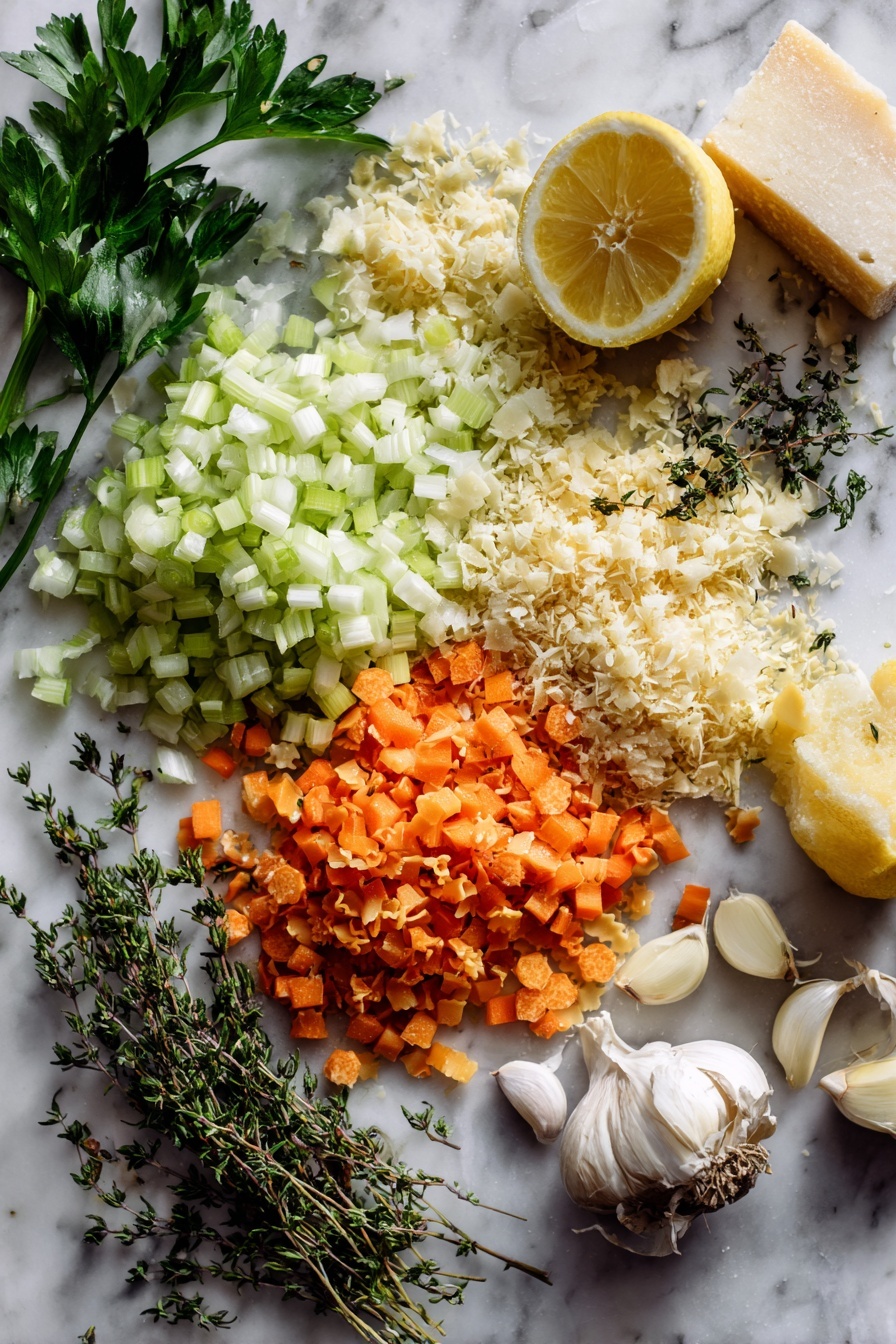
- Unsalted Butter: It’s the base flavor layer here without overpowering the fresh veggies’ taste.
- Celery: Adds subtle crunch and a hint of earthiness when cooked down.
- Carrot: Sweetness that balances the savoriness.
- Onion: Classic soup aromatics providing depth and warmth.
- Garlic: Just enough to give that comforting, aromatic punch.
- Fresh Thyme: Adds an herbal note that feels authentically Italian.
- Pastina: Tiny pasta that cooks quickly and soaks up all the flavors perfectly.
- Chicken Bone Broth: Rich and nourishing – but feel free to use veggie broth for a vegetarian version.
- Turmeric: Adds a warm color and subtle health perks without a strong flavor.
- Parmesan Cheese: Sharp, salty, and melty – a final flavor boost that’s just heavenly.
- Egg: Tempered into the soup for extra creaminess without the heaviness of cream.
- Fresh Parsley: Brightens everything up with a fresh, herbal finish.
- Lemon Juice: A zesty pop to cut through the richness and bring balance.
- Kosher Salt and Black Pepper: Essential for perfect seasoning – don’t skimp here!
Tweak to Your Taste
I love how flexible this Italian Pastina Soup Recipe is — honestly, I’ve tried adding a few twists here and there to suit the occasion or what I have on hand. Don’t be afraid to play around a bit and make it your own.
- Vegetarian Variation: Swap chicken bone broth for a rich vegetable broth and skip the egg or use a plant-based substitute; still delicious and comforting.
- Spice it Up: If you like a little heat, add a pinch of red pepper flakes with the garlic – I do this when I want a bit of warmth on chilly evenings.
- Seasonal Veggies: Feel free to add finely diced zucchini or spinach in the last few minutes for some extra greens.
- Make It Heartier: Stir in shredded cooked chicken or beans to turn this into a meal-perfect option.
Step-by-Step: How I Make Italian Pastina Soup Recipe
Step 1: Sauté the Veggies Until They’re Soft and Glowing
Start by melting your butter in a good-sized soup pot over medium-high heat. The butter brings a gentle richness, so I don’t skip this step. Toss in the finely diced celery, carrot, onion, and minced garlic and cook until everything softens and smells amazing — about 8 to 12 minutes. You want the veggies tender but not browned, so keep an eye on the heat and stir now and then. This is where the flavor foundation builds, so be patient here.
Step 2: Add Herbs, Broth, and a Hint of Turmeric for Color
Once your veggies are beautifully softened, add the fresh thyme sprigs, chicken bone broth, and a pinch of turmeric. That little turmeric bit brightens the soup’s color without overpowering the subtle flavors. Bring the mixture to a simmer, then lower the heat so everything can mingle gently for 20 to 30 minutes. This slow simmer is like letting the soup tell its story; the flavors deepen and cozy up.
Step 3: Puree and Season
After simmering, I use an immersion blender right in the pot to puree the soup until it’s lush and smooth, with all the vegetable goodness fully blended into the broth. Don’t stress if you don’t have one – a regular blender works fine; just be cautious with the hot liquid. Taste here and adjust your salt and pepper—you want it well-seasoned because that’s what makes all the difference.
Step 4: Cook the Pastina to Perfection
Once your soup is silky, stir in the pastina and raise the heat to reach a gentle rolling simmer. Keep the pot covered and let the pasta cook according to package instructions, usually a few minutes, until tender but still holding its shape. This step needs attention because pastina cooks fast and can turn mushy if left too long.
Step 5: Brighten and Enrich with Lemon, Parsley, Parmesan, and Egg
Here’s my favorite finishing touch: squeeze in fresh lemon juice and sprinkle in minced parsley and parmesan cheese. Then, let your soup cool slightly (about 5 minutes) before tempering the beaten egg. I do this by ladling a little hot broth into the egg while stirring briskly, then slowly whisk the egg mixture back into the pot. This technique gives the soup a silky richness without curdling—trust me, it feels fancy but is super easy once you’ve done it a couple of times!
💡 Pro Tips for Making Italian Pastina Soup Recipe
- Mind Your Heat: Simmer gently rather than boil vigorously after adding broth to keep that velvety texture.
- Thin Veggie Dice: Finely chopped veggies cook evenly and blend better, giving a smoother final soup.
- Don’t Skip Tempering the Egg: It’s key for creamy soup without scrambled egg mishaps—slow and steady wins here!
- Use Fresh Cheese: Freshly grated parmesan melts beautifully, enhancing flavor and texture far better than pre-grated.
How to Serve Italian Pastina Soup Recipe
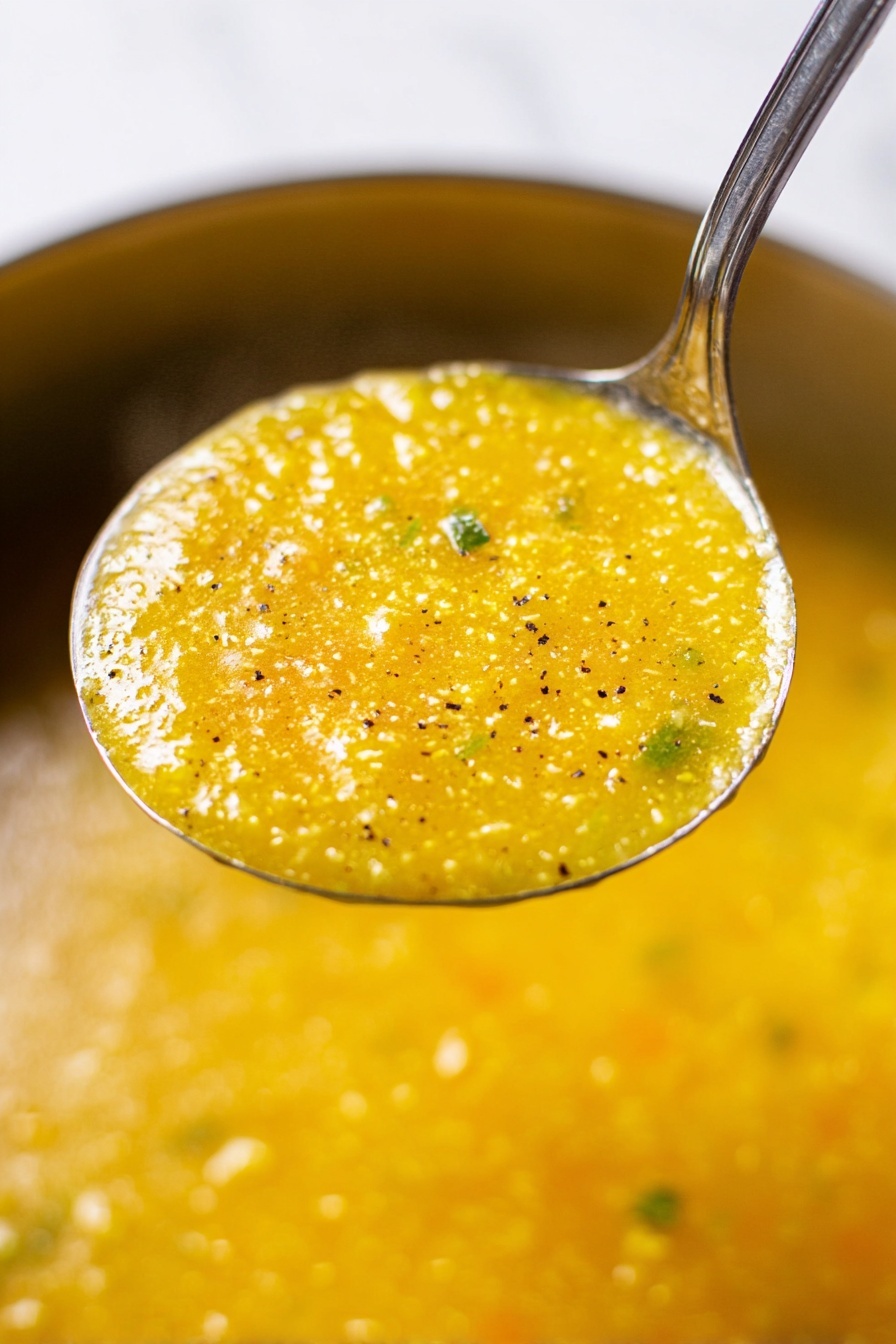
Garnishes
When I serve this soup, I always add an extra sprinkle of parmesan and a crack of fresh black pepper on top—just because it looks inviting and ups the flavor. Sometimes I toss a few extra parsley leaves on, too, for a little fresh pop. If you want a cozy touch, a drizzle of good olive oil or a pinch of chili flakes works wonders.
Side Dishes
This Italian Pastina Soup pairs perfectly with crusty Italian bread or a simple green salad with a tangy vinaigrette. I especially love a side of garlic breadsticks when I’m hosting—easy to dunk and delicious!
Creative Ways to Present
For special occasions, I’ve served this soup in charming mini soup crocks or small ceramic bowls to make it feel like a fancy starter. Adding a parmesan crisp on top adds a fun crunch that guests love. You can also swirl in a little pesto for a bright green contrast as a garnish.
Make Ahead and Storage
Storing Leftovers
I store leftover Italian Pastina Soup in airtight glass containers in the fridge for up to 3 days. Because pastina swells, I prefer to slightly undercook the pasta the first time so leftovers don’t get mushy when reheated.
Freezing
Freezing works fine, but I recommend freezing the soup before adding the pasta and egg. Freeze in portions, then when thawing, add fresh pastina and temper in an egg during reheating for best texture and flavor.
Reheating
Reheat gently on the stove over medium-low heat, stirring often to prevent sticking. If it thickens too much, add a splash of broth or water to loosen it up. If you froze it without pastina and egg, add those fresh now to keep the soup light and silky.
FAQs
-
Can I make Italian Pastina Soup Recipe vegetarian?
Absolutely! Just swap the chicken bone broth for a flavorful vegetable broth and omit the egg or use a plant-based alternative to keep it vegetarian-friendly without losing that comforting richness.
-
How long does pastina take to cook in this soup?
Pastina cooks super fast—usually 3 to 5 minutes at a gentle simmer. Watch it carefully to avoid it turning mushy; it should be tender but still hold its shape.
-
What if I don’t have an immersion blender?
No worries! Just carefully transfer your soup in batches to a regular blender to puree until smooth. Just be cautious with hot liquid—blend in small batches and vent the lid slightly to avoid steam buildup.
-
Can this soup be made ahead for meal prep?
Yes, but I recommend cooking pastina fresh when reheating leftovers to keep the texture just right. You can prepare and freeze the soup base ahead and add the pasta and egg at serving time.
Final Thoughts
This Italian Pastina Soup Recipe is truly a staple in my kitchen — it’s that comforting, tasty go-to that feels special but is super simple to make. I hope you enjoy whipping it up as much as I do, and that it finds a place on your favorites list too. Give it a try on your next cozy night in, and trust me, it’ll warm you from the inside out.
Print
Italian Pastina Soup Recipe
- Prep Time: 15 minutes
- Cook Time: 30 minutes
- Total Time: 45 minutes
- Yield: 4 servings
- Category: Soup
- Method: Stovetop
- Cuisine: Italian
- Diet: Low Lactose
Description
This Italian Pastina Soup is a comforting and creamy classic, featuring finely diced vegetables simmered in flavorful chicken bone broth, pureed to a smooth texture, and enriched with Parmesan cheese and a tempered egg for added richness. Perfect for a cozy meal, this soup balances delicate pastina pasta with aromatic herbs and a hint of lemon.
Ingredients
Vegetables and Aromatics
- 2 tablespoons unsalted butter
- 1/2 cup celery, finely diced
- 1/2 cup carrot, finely diced
- 1 cup onion, finely diced
- 3 cloves garlic, minced
- 3 – 4 sprigs fresh thyme, stripped
Soup Base and Seasonings
- 1 quart chicken bone broth
- 1/8 teaspoon turmeric
- Kosher salt, to taste
- Freshly cracked black pepper, to taste
Pasta and Final Ingredients
- 1 cup pastina
- 1/2 cup Parmesan cheese, grated
- 1 egg, beaten
- 2 tablespoons fresh parsley, minced
- 1/2 lemon, juiced
Instructions
- Preheat Pot: Place a soup pot over medium-high heat and melt 2 tablespoons of unsalted butter until it is hot and bubbly.
- Sauté Vegetables: Add the finely diced celery, carrot, onion, and minced garlic to the pot. Cook them, stirring occasionally, until the vegetables soften and become fragrant, about 12 minutes.
- Add Herbs and Broth: Stir in the stripped fresh thyme, chicken bone broth, and turmeric. Bring the mixture to a simmer, then reduce the heat to low and let the soup simmer gently for 30 minutes to develop flavor.
- Puree Soup: Using an immersion blender, carefully puree the soup directly in the pot until it is smooth and the vegetables are fully integrated into the broth. Taste and season with kosher salt and freshly cracked black pepper to your preference.
- Cook Pastina: Add the pastina pasta to the pureed broth and increase the heat to bring the soup back to a rolling simmer. Cover the pot and cook until the pasta is tender, following the package’s recommended cooking time, approximately 7 to 10 minutes, then remove from heat.
- Add Finishing Touches: Stir in freshly squeezed lemon juice, minced parsley, and grated Parmesan cheese. Let the soup cool slightly for 5 minutes.
- Temper Egg: Slowly ladle a small amount of soup broth into the beaten egg while stirring continuously to temper it. Then pour the tempered egg mixture back into the soup, stirring steadily to avoid curdling and to enrich the soup.
- Serve: Garnish the soup with extra Parmesan cheese and a sprinkle of freshly cracked black pepper. Serve warm and enjoy the creamy comforting flavors.
Notes
- Use chicken bone broth for a rich, deep flavor; vegetable broth can be substituted for a vegetarian version.
- Be careful when tempering the egg to prevent scrambling—adding broth slowly while stirring is key.
- Pastina cooks quickly; watch closely to avoid overcooking and turning it mushy.
- Fresh thyme can be replaced with dried thyme, but reduce quantity to 1 teaspoon.
- For a gluten-free version, substitute pastina with a gluten-free tiny pasta.
- Leftover soup can be refrigerated for up to 3 days; reheat gently to avoid breaking the emulsion.
Nutrition
- Serving Size: 1 cup
- Calories: 250 kcal
- Sugar: 3 g
- Sodium: 650 mg
- Fat: 12 g
- Saturated Fat: 6 g
- Unsaturated Fat: 5 g
- Trans Fat: 0 g
- Carbohydrates: 22 g
- Fiber: 2 g
- Protein: 12 g
- Cholesterol: 85 mg

